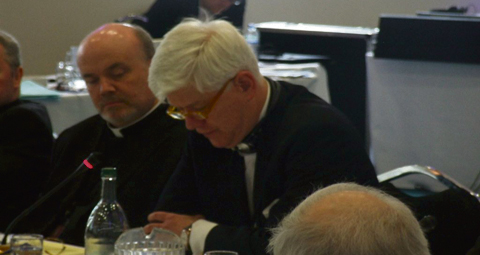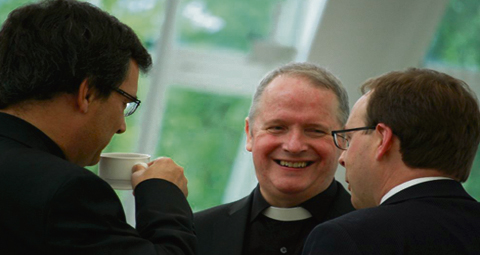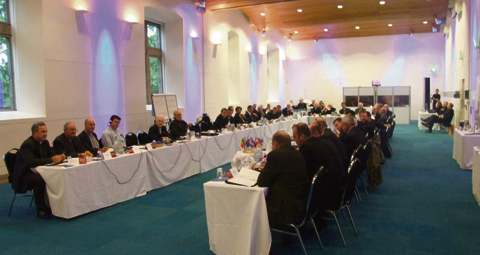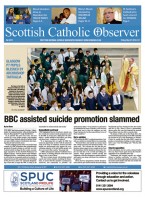BY Ian Dunn | July 6 | ![]() 0 COMMENTS
0 COMMENTS ![]() print
print
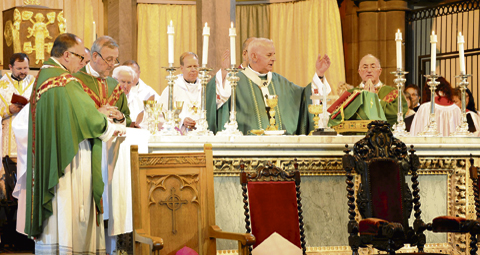
Is there a need for a Catholic intellectual renaissance?
— Professor John Haldane stresses need for faith in action at meeting of general secretaries of Council of European Bishops’ Conferences
Delegates at the 40th meeting of general secretaries of the Council of European Bishops’ Conferences in Edinburgh last weekend heard that a ‘Catholic intellectual renaissance’ was essential if religious liberties and Catholic schools were to be saved from aggressive secularism.
Keynote speaker, Professor John Haldane (below), told them that influential Catholics from across Europe were visiting Scotland during a ‘campaign’ of ‘de-evangelisation’ targeted at the Catholic Church here.
Marriage, schools
This campaign, the professor warned, was currently manifested in the debate over same-sex ‘marriage’ and the ongoing attacks on Catholic schools.
“Once the immediate issue of gay ‘marriage’ is resolved and especially if it is done in a way that is seem to represent a defeat for the Church it will not be long before the issue of schooling is returned to,” he warned. “Now with the additional complaint that given Catholic teachings on sex and marriage, Catholic schools are at best an obstacle and at worst a real and present threat to the establishment and civility.”
Professor Haldane told the conference delegates it was ‘secularism that poses the greatest threat to the Future of the Catholic Faith here in Scotland and in Europe more generally.’
In response to this he called on laity and clergy across Europe to embrace ‘intellectual excellence’ and ‘moral courage,’ virtue he said that is now too ‘rare among both.’
Secularism
Professor Haldane’s warning was echoed throughout the weekend and heard by the likes of Cardinal Keith O’Brien; Archbishop Mario Conti of Glasgow; Bishop Emeritus Peter Moran of Aberdeen; Fr Andrew McKenzie of Priests for Scotland; Mgr Marcus Stock, representing England and Wales, and Mgr Gearoid Dullae from Ireland.
In the closing Mass of the Conference on Sunday (above), Cardinal O’Brien echoed Pope Benedict’s words that ‘religion is not a problem for legislators to solve, but a vital contributor to the national conversation.’
Further, in the reports that were submitted to the conference by delegates from across Europe the theme of the curtailment of religious liberty through methods such as same-sex ‘marriage’ was raised again and again.
Bishop Gintaras Grusas, general secretary of the Lithuanian Bishops’ Conference said ‘across Europe there is a sense that the Christian community, and Christian values, are under attack.’ “By a secular society which feels uncomfortable with the challenges that are put forth by the expression of not only religious but today some moral values,” he said. “The laws that are being proposed in the directives out of Brussels do impact all our countries. We need to evangelise the society in which we live.”
Combatting threats
An example of how to combat this threat was provided by Mgr Ronnie Jenkins, the general secretary of the American Bishops’ Conference, who spoke of how his church had aggressively combated attempts to limit their freedoms.
He said that while there had been a long history of Catholic persecution in the United States, exemplified by the ‘Ku Klux Klan who persecuted many Catholics in the 1920s’ much of the last 40 years had been harmonious.
Recently though, he said, this had changed and the Church had faced numerous attacks culminating in President Barack Obama’s recent attempt to force Church hospitals to provide contraception to employees.
“Religious freedom cannot be limited to freedom of worship,” he said. “Christians must be free to act according to their religion.”
To that end, he said, the Church had embraced a policy of ‘lawsuits against the Government,’ ‘Catechesis among the young’ and ‘unity among the bishops.’
Prayer and reflection
Conference organiser Mgr Paul Conroy (below), general secretary of the Bishops’ Conference of Scotland, was satisfied the delegates ‘are going home with the sense of having achieved, having done some good work.’
He added that ‘anyone who was here would have been aware of the warmth, the cordiality, the support and the friendship that is around.’
Mgr Conroy concluded the conference by highlighting ‘it is always important at these meetings that we spend a fair bit of the programme praying together, which underlines really the most important aspect of what we are about, we are about working for Christ and for the Church.’
Pic above: Paul McSherry









